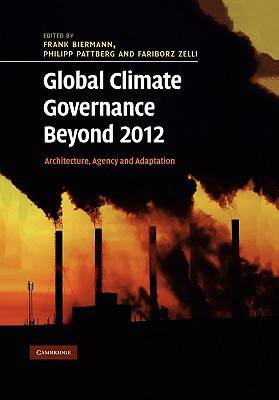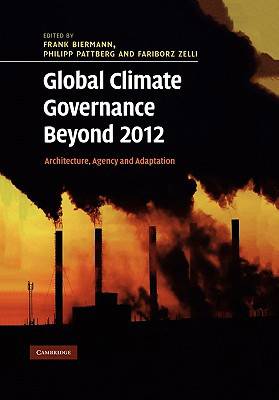
Door een staking bij bpost kan je online bestelling op dit moment iets langer onderweg zijn dan voorzien. Dringend iets nodig? Onze winkels ontvangen jou met open armen!
- Afhalen na 1 uur in een winkel met voorraad
- Gratis thuislevering in België vanaf € 30
- Ruim aanbod met 7 miljoen producten
Door een staking bij bpost kan je online bestelling op dit moment iets langer onderweg zijn dan voorzien. Dringend iets nodig? Onze winkels ontvangen jou met open armen!
- Afhalen na 1 uur in een winkel met voorraad
- Gratis thuislevering in België vanaf € 30
- Ruim aanbod met 7 miljoen producten
Zoeken
Global Climate Governance Beyond 2012
Architecture, Agency and Adaptation
Philipp Pattberg, Fariborz Zelli
Paperback | Engels
€ 93,95
+ 187 punten
Omschrijving
An assessment of policy options for future global climate governance, written by a team of leading experts from the European Union and developing countries. Global climate governance is at a crossroads. The 1997 Kyoto Protocol was merely a first step, and its core commitments expire in 2012. This book addresses three questions which will be central to any new climate agreement. What is the most effective overall legal and institutional architecture for successful and equitable climate politics? What role should non-state actors play, including multinational corporations, non-governmental organizations, public-private partnerships and market mechanisms in general? How can we deal with the growing challenge of adapting our existing institutions to a substantially warmer world? This important resource offers policy practitioners in-depth qualitative and quantitative assessments of the costs and benefits of various policy options, and also offers academics from wide-ranging disciplines insight into innovative interdisciplinary approaches towards international climate negotiations.
Specificaties
Betrokkenen
- Auteur(s):
- Uitgeverij:
Inhoud
- Aantal bladzijden:
- 350
- Taal:
- Engels
Eigenschappen
- Productcode (EAN):
- 9780521180924
- Verschijningsdatum:
- 11/11/2010
- Uitvoering:
- Paperback
- Formaat:
- Trade paperback (VS)
- Afmetingen:
- 170 mm x 244 mm
- Gewicht:
- 557 g

Alleen bij Standaard Boekhandel
+ 187 punten op je klantenkaart van Standaard Boekhandel
Beoordelingen
We publiceren alleen reviews die voldoen aan de voorwaarden voor reviews. Bekijk onze voorwaarden voor reviews.











